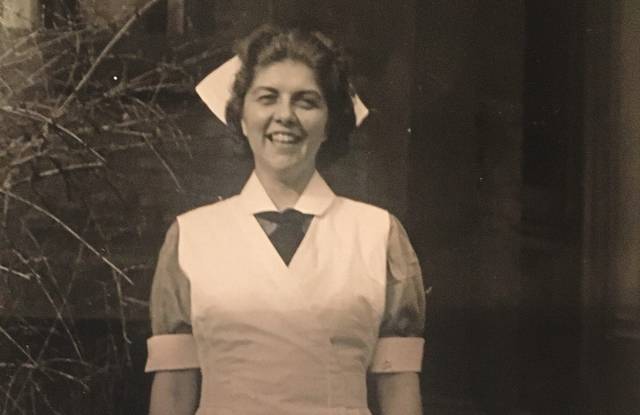This month, National Nurses Month, we honor nurses throughout history, noting the brave care they are presently administering for victims of the coronavirus.
All of us have benefited from nursing care, from the time we were born to the end of our lives. The word nurse comes from old-French nourice, which derives from Latin nutricius, which means “to nourish” or “to give sustenance.” Nurses take care of the wounded, heal the sick and provide emotional comfort. They truly “nourish” humanity.
My aunt, Mary Beatrice Dalbey-Rigg, taught me much about the importance of having good nurses in a society.
Mary was born in Burlington, N.J., May 17, 1916. After graduating magna cum laude from Rider College in 1939, she taught high school for five years, earned her master’s degree in education at Rutgers University and attended Yale Nursing School. She married her professor, Albert Schaffle, and, though she had enjoyed being at Yale and dealing with many servicemen who would soon ship out overseas after the outbreak of war in December 1941, she decided to leave nursing to start a family.
Unfortunately, she was unable to have children, so her dream of having six sons was never realized. After her husband’s untimely death a decade later, she went back to Yale School of Nursing in 1954 and graduated in 1957 at the top of her class and as the oldest graduate.
She loved the years she spent nursing in hospitals and especially focused on taking care of veterans, since her brother and my uncle, U.S. Army 1st Lt. Frank Rigg, had fought in the Pacific and received a debilitating hand injury fighting the Japanese at Anguar near Pelilieu.
Besides caring for the wounded and sick in New Haven, Conn., she also rose up through the teaching ranks at Yale and taught courses on the science of nursing — she became a real student of her profession.
She taught me that if a doctor wanted to get anything done in a hospital, he or she needed to take care of the nurses. She said, with a sly smile, that if a doctor wasn’t nice, “then his or her schedule would somehow get messed up all the time and he/she often would not have the supplies he/she needed and life would just, in general, be made miserable for the doctor. However, if a doctor was nice to us nurses, that doctor became the most brilliant doctor in the ward. We nurses run the show — the doctors get the glory, but we provide the foundation for that fame.”
Even if they did not like the doctors, she said, they always took care of the sick and wounded and gave them the best care possible — they always “nourished” the souls in their charge.
Her reputation was so good at Yale that in retirement, the Yale School of Medicine continued to send doctors in training to her to learn how to behave with patients and nurses. She performed this role for almost two decades, shaping hundreds of Yale doctors from 1988-2008. She taught me that the medical world’s foundation is indeed built on the backs of nurses.
Sadly, nurses haven’t always been revered in history. In my latest book, “Flamethrower,” I share the tragedy of what happened to Allied nurses in Hong Kong when the Japanese sacked the city in December 1941: Most were brutally raped and murdered by Imperial Japanese soldiers. One nurse who survived the beatings and rapes became a dear friend of my Aunt Mary’s in the 1950s. She shared her story of heartache, pain and struggle on the front lines and in a Japanese POW camp.
Nurses have always put their lives on the front lines of war to take care of our military, becoming not only firsthand witnesses of the results of the world of violence and bloodshed, but often part of the engagements. In “Flamethrower,” I share the stories of nurses who served bravely on Iwo Jima and on the hospital ships right off shore during that battle. One takes note of flight nurse U.S. Navy Ensign Jane Kendeigh, who landed on Iwo Jima on March 6, 1945 to help divvy out medical supplies and whole blood for transfusions for the wounded. She was the first nurse on Iwo Jima and the first to fly directly into an active battlefield.
Such nurses have been with us in the ranks for more than 100 years. They currently are bravely helping the hundreds of thousands who are sick with coronavirus on a new battlefront. We need to always have in mind that they are the backbone of any medical operations and we honor them today. They are sacred elements of our society and military.
Bryan Mark Rigg is a World War II military historian and author of five books.








